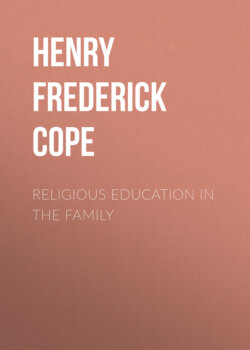Читать книгу Religious Education in the Family - Henry Frederick Cope - Страница 9
На сайте Литреса книга снята с продажи.
§ 5. MOTIVES FOR A STUDY OF THE FAMILY
ОглавлениеThe modern family is worthy of our careful study. It demands painstaking attention, both because of its immediate importance to human happiness and because of its potentiality for the future of society. The kind of home and the character of family life which will best serve the world and fulfil the will of God cannot be determined by sentiment or supposition. We are under the highest and sternest obligation to discover the laws of the family, those social laws which are determined by its nature and purpose, to find right standards for family life, to discriminate between the things that are permanent and those that are passing, between those we must conserve and those we must discard, to be prepared to fit children for the finer and higher type of family life that must come in the future.
Methods of securing family efficiency will not be discovered by accident. If it is worth while to study the minor details, such as baking cakes and sweeping floors, surely it is even more important to study the larger problems of organization and discipline. There is a science of home-direction and an art of family living; both must be learned with patient study.
It is a costly thing to keep a home where honor, the joy of love, and high ideals dwell ever. It costs time, pleasures, and so-called social advantages, as well as money and labor. It must cost thought, study, and investigation. It demands and deserves sacrifice; it is too sacred to be cheap. The building of a home is a work that endures to eternity, and that kind of work never was done with ease or without pain and loss and the investment of much time. Patient study of the problems of the family is a part of the price which all may pay.
No nobler social work, no deeper religious work, no higher educational work is done anywhere than that of the men and women, high or humble, who set themselves to the fitting of their children for life's business, equipping them with principles and habits upon which they may fall back in trying hours, and making of home the sweetest, strongest, holiest, happiest place on earth.
Heaven only knows the price that must be paid for that; heaven only knows the worth of that work. But if we are wise we shall each take up our work for our world where it lies nearest to us, in co-operation with parents, in service and sacrifice as parents or kin, our work in the shop where manhood is in the making, where it is being made fit to dwell long in the land, in the family at home.
I. References for Study
Edward Lyttleton, The Corner-Stone of Education, chaps. i, vii. Putnam, $1.50.
A. Gandier, "Religious Education in the Home," Religious Education, June, 1914, pp. 233–42.
II. Further Reading
The Family a Religious Agency
C. F. and C. B. Thwing, The Family. Lothrop, Lee & Shepard, $1.60.
J. D. Folsom, Religious Education in the Home. Eaton & Mains, $0.75.
G. A. Coe, Education in Religion and Morals. Revell, $1.35.
The Place of the Family
A. J. Todd, The Family as an Educational Agency. Putnam, $2.00.
W. F. Lofthouse, Ethics and the Family. Hodder & Stoughton, $2.50.
J. B. Robins, The Family a Necessity. Revell, $1.25.
III. Topics for Discussion
1. Describe the changes within recent times in the conditions of the home, its work, housing, and supplies. How far have these changes affected the community of the family, the continuity of its personal relationships, and its religious service?
2. What are the fundamental causes of family disasters? Admitting that there are sufficient grounds for divorce in numerous instances, what other causes enter into the high number of divorces?
3. State in your own terms the ultimate reasons for the maintenance of a family.
4. What are the motives which would make people willing to bear the high cost of founding and conducting a home?
5. What points of emphasis does this study suggest in the matter of the education of public opinion?
6. State your distinction between the family and the home; which is the more important and why?
1 The Corner-Stone of Education, by Edward Lyttleton, headmaster of Eton, is a striking argument on the determinative influence of parental habits and attitudes of mind.
